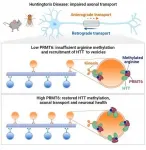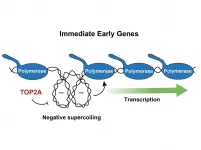USPSTF statement on screening for vitamin D deficiency in adults
2021-04-13
(Press-News.org) Bottom Line: The U.S. Preventive Services Task Force (USPSTF) concludes that the current evidence is insufficient to make a recommendation about screening for vitamin D deficiency in asymptomatic adults. Vitamin D performs an important role in bone metabolism. Requirements may vary by individual and no one blood vitamin D level defines deficiency. The USPSTF routinely makes recommendations about the effectiveness of preventive care services and this recommendation updates and is consistent with its 2014 statement.
To access the embargoed study: Visit our For The Media website at this link https://media.jamanetwork.com/
(doi:10.1001/jama.2021.3069)
Editor's Note: Please see the article for additional information, including other authors, author contributions and affiliations, financial disclosures, funding and support, etc.
Note: More information about the U.S. Preventive Services Task Force, its process, and its recommendations can be found on the newsroom page of its website.
INFORMATION:
Media advisory: To contact the U.S. Preventive Services Task Force, email the Media Coordinator at Newsroom@USPSTF.net or call 301-951-9203. The full report and related articles are linked to this news release.
Embed this link to provide your readers free access to the full-text article This link will be live at the embargo time and all USPSTF articles remain free indefinitely https://jamanetwork.com/journals/jama/fullarticle/10.1001/jama.2021.3069?guestAccessKey=2027cb00-d6bc-4784-9051-f7bb4f119c24&utm_source=For_The_Media&utm_medium=referral&utm_campaign=ftm_links&utm_content=tfl&utm_term=041321
ELSE PRESS RELEASES FROM THIS DATE:
2021-04-13
New research led by the Garvan Institute of Medical Research has revealed how breast cancer cells that develop during or after pregnancy change their environment to form more aggressive tumours.
In experimental models of pregnancy-associated breast cancer, researchers found that cancer cells send signals to the connective tissue around them to trigger uncontrolled inflammation and remodel the tissue, which in turn helps the cancer to spread.
"Breast cancers that arise during or shortly after pregnancy are highly aggressive as they often become resistant to standard therapies. With 50% of cases ...
2021-04-13
Huntington's disease is a genetic neurodegenerative disorder caused by mutations in the protein huntingtin and characterized by involuntary dance-like movements, severe behavioural changes and cognitive impairment. That neuronal traffic is impaired in this disease has been very well known for several years. But that this deranged trafficking could be ameliorated by increasing huntingtin methylation was not yet known. The findings emerged from an international research work coordinated by the University of Trento and published in Cell Reports.
The research teams identified the fundamental role of the protein arginine methyltransferase PRMT6 in ensuring transport along axons, the routes that connect nerve cells to each other, and hence the health of neurons. ...
2021-04-13
Researchers from the group of Hans Clevers (Hubrecht Institute) developed the first patient-derived organoid model for cervical cancer. They also modelled the healthy human cervix using organoids. In close collaboration with the UMC Utrecht, Princess Máxima Center for pediatric oncology and the Netherlands Cancer Institute, the researchers used the organoid-based platform to study sexually transmitted infections for a herpes virus. The model can potentially also be used to study the human papillomavirus (HPV), which is one of the main causes of cervical cancer. The results were published in Cell Stem Cell on the 13th of April.
Cervical cancer is a common gynecological malignancy, often caused by the human papillomavirus (HPV). However, good models to study human ...
2021-04-13
(Boston)--How could studying gastrointestinal cells help the fight against COVD-19, which is a respiratory disease? According to a team led by Gustavo Mostoslavsky, MD, PhD, at the BU/BMC Center for Regenerative Medicine (CReM) and Elke Mühlberger, PhD, from the National Emerging Infectious Diseases Laboratories (NEIDL) at Boston University, testing how SARS-CoV-2 affects the gut can potentially serve to test novel therapeutics for COVID-19.
In order to study SARS-CoV-2, models are needed that can duplicate disease development in humans, identify potential targets and enable drug testing. BU researchers have created human induced pluripotent stem cells (iPSC)-derived intestinal organoids or 3-D models that can be infected and replicated ...
2021-04-13
The (when stretched) two-metre-long DNA molecule in each human cell is continuously being unpacked and packed again to enable the expression of genetic information. When genes must be accessed for transcription, the DNA double helix unwinds and the strands separate from each other so that all the elements needed for gene expression can access the relevant DNA region. This process results in the accumulation of DNA supercoiling that needs to be resolved. A study recently published by Felipe Cortés, Head of the Topology and DNA Breaks Group at the Spanish National Cancer Research Centre (CNIO), and the members of his team, in cooperation with Silvia Jimeno González, Professor ...
2021-04-13
Understanding the effects of specific mutations in gene regulatory regions - the sections of DNA and RNA that turn genes on and off - is important to unraveling how the genome works, as well as normal development and disease. But studying a large variety of mutations in these regulatory regions in a systematic way is a monumental task. While progress has been made in cell lines and yeast, few studies in live animals have been done, especially in large populations.
Experimental and computational biologists at the Max Delbrück Center for Molecular Medicine in the Helmholtz Association (MDC) have teamed up to establish an approach to induce thousands of different mutations in up to 1 million ...
2021-04-13
Electrochemical processes could be used to convert CO2 into useful starting materials for industry. To optimise the processes, chemists are attempting to calculate in detail the energy costs caused by the various reaction partners and steps. Researchers from Ruhr-Universität Bochum (RUB) and Sorbonne Université in Paris have discovered how small hydrophobic molecules, such as CO2, contribute to the energy costs of such reactions by analysing how the molecules interact in water at the interface. The team describes the results in the journal Proceedings of the National Academy of Sciences, PNAS for short, published online on 13 April 2021.
To conduct the ...
2021-04-13
The time children and adolescents spend on screen time entertainment -computers, mobile phones, television and video games- adversely affects their eating habits. This is the main conclusion drawn from a research carried out by EpiPHAAN (Epidemiology, Physical Activity, Accelerometry and Nutrition) research group of the University of Malaga, which further establishes that parents' education level is also associated with the adherence to the Mediterranean diet.
This research was conducted within the PASOS Study -Physical Activity, Sedentarism, lifestyles and Obesity in Spanish youth- of Gasol Foundation, which analyzed more than ...
2021-04-13
Cancer patients from the UK were 1.5 times more likely to die following a diagnosis with COVID-19 than cancer patients from European countries.
This is the finding of a study of over 1000 patients - 924 from European countries and 468 from the UK - during the first wave of the COVID-19 pandemic. The research team, led by Imperial College London, say the study highlights the need for UK cancer patients to be prioritised for vaccination.
The study tracked data between 27 February to 10 September 2020, across 27 centres in six countries: Italy, Spain, France, Belgium, Germany and the UK.
The results, published in the European Journal of Cancer, showed that 30 days after a COVID-19 diagnosis, 40.38 per cent of UK cancer patients had died, versus 26.5 per cent of ...
2021-04-13
Artificial intelligence could be one of the keys for limiting the spread of infection in future pandemics. In a new study, researchers at the University of Gothenburg have investigated how machine learning can be used to find effective testing methods during epidemic outbreaks, thereby helping to better control the outbreaks.
In the study, the researchers developed a method to improve testing strategies during epidemic outbreaks and with relatively limited information be able to predict which individuals offer the best potential for testing.
"This can be a first step towards society ...
LAST 30 PRESS RELEASES:
[Press-News.org] USPSTF statement on screening for vitamin D deficiency in adults




